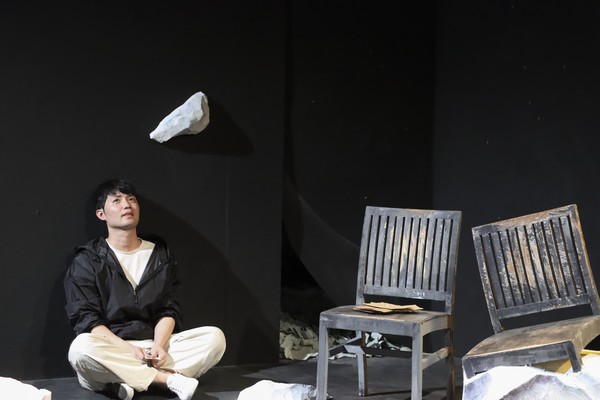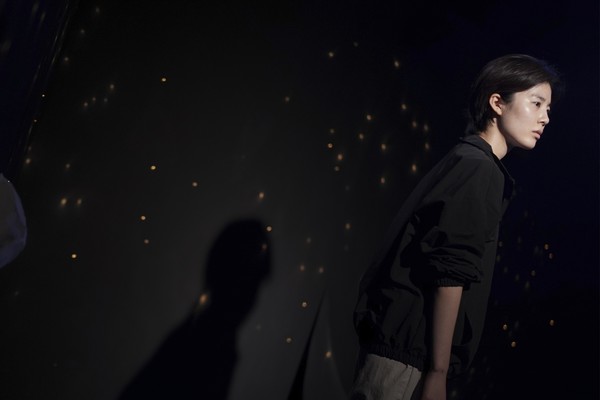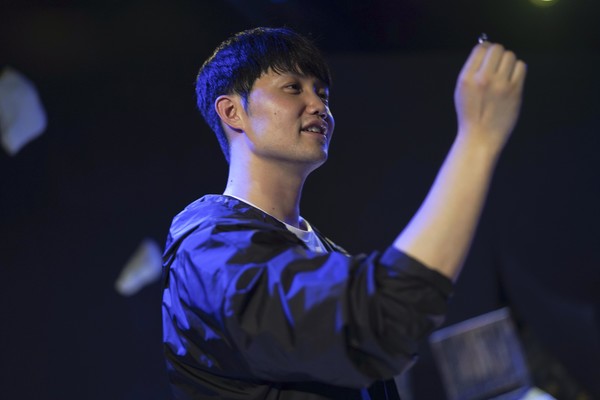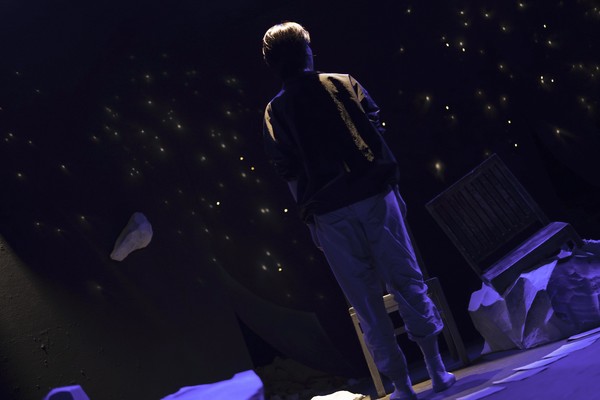Everyone has an experience of waiting for their beloved. It is hard and the time seems to drag on forever. How would it feel if the background where you were waiting is space, and a future where the shifting between planets was possible? The time here and there will differ and thus embracing the silence would feel drearier and more desperate. Here, <I’m Waiting for You> shows the way ‘I’ feel while waiting for ‘you’ in the future where interstellar travel is viable. The congregation of science and play is quite novel but the pleasing harmony of itself gleams the sensitivity. Let’s check up on the autumn performance <I’m Waiting for You> presented by students from the School of Performing Arts and Media, College of Arts, Chung-Ang University.
1. Synopsis
The setting of the play is a future where space travel, moving freely among the planets, is available. The protagonist ‘I[1](Seong-ha)’ is waiting for ‘you’, ‘my’ fiancée traveling to see his/her emigrating family off to Alpha Centauri for 9 years. ‘I’ get in a ‘ship of waiting’, where people can decrease the years of space travel time by traveling to other timelines, to cut the 9 years of waiting into half. Based on relativity theory, ‘I’ decide to reduce the time of waiting utilizing the relatively different time and space between the planet in which ‘you’ are and ‘I’ am. However, the time keeps stretching due to unexpected accidents such as the captain’s misunderstanding, and the circumstances of the earth. The moment before the collapse Earth in chaos, and the distance between ‘I’ and ‘you’ is not getting closer as time passes by. Nevertheless, ‘I’ am still waiting for ‘you.’

2. Immersive Play: Involving Audiences
Also known as an audience participation play, this type of play tears down the fourth wall between the main stage and the audience and encourages the audience to participate in the play freely. The main actor leads the performance alone under the spotlight shone on the main stage. Therefore, the scenes which need the opposite role for the second presentation of the conversation between the characters require the help of the audience. In order to make the audience concentrate on the play and captivate their mind, the actor gives a numbered paper card with a few words or lines to each audience member. After the play starts and the assigned number of card is shown on the monitor, an audience member with that number card reads the lines written on the card to keep the play flowing. One could be a ‘friend’ to ‘I’, another could be a ‘captain’, or ‘you’. In this way, viewers don’t just watch the play, but they feel involved in the play more deeply. People get mesmerized by assimilating into the actors’ emotions which deepen throughout the play.

3. The Letters
The main character Seong-ha writes a letter to his/her lover who left for Alpha Centauri. The actor conveys the contents of the letters adding the waiting and love emotion of ‘I’ by the monologue and conversation with the spectators. The actor leads the play by reciting the letters dynamically to audiences. “I woke up 10 times a night… I was afraid you would turn away angrily even as I write this letter. I was afraid of you not writing me back in anger.” In the way the protagonist waits for ‘you’ and goes his/her way to meet ‘you’, ‘I’ write various emotions of realization. There are times when ‘you’ don’t reply, so ‘I’ don’t know whether the letters safely arrive, or ‘you’ are alive. For many days ‘I’ feel anxious and disappointed; however, ‘I’ constantly write ‘you’ the letter. At this point, the letters act as a bridge of connecting the message of straight love towards ‘you’ to the audience. The actor fluently transitions between emotions like the fluttering mind of feeling like ‘I’ will meet ‘you’ in any minute to facing the huge misfortune as despairing days go by.

4. The Waiting
The play deals with the Theory of Relativity. The time in space and on Earth is different. Living in a different timeline means staying in other places. The key word of this play, waiting, appears in a profuse expression of emotion. ‘I’ leave on a voyage following the ‘orbit of waiting,’ where people can go to another timeline, to meet ‘you’. The waiting which started with 1 second becomes a few hundred years, and after hundreds of years ‘I’ am isolated in space waiting for ‘you.’ ‘I’ experience the dark time of anger, denial, and depression during the indefinite waiting. However, ‘I’ wait for ‘you’, whoever ‘you’ are with, whatever shape ‘you’ are, and finally, waiting over hundreds of years, ‘I’ face the letter from ‘you,’ who told me “We are living in the same timeline.” The letter ‘you’ send contains the words, “I’m here. I’m waiting for you.” Waiting in the play is represented through the language of ‘I’ and ‘you’, and the words, “I am waiting for you” function the same as “I love you.”

‘I(Seong-ha)’ am waiting for ‘you’ in the infinite universe. In that the deep nature of waiting resembles the space, “my” isolation strengthens maximally in the spatial place. The play <I’m waiting for you> tells a story of my lonely remaining. The lone actor appears in the play, gives shape to the emotions, and fills the theater with grief. The play makes us think of love and staying still and leaves a question to us. Would you endure your risk of insecurity for your dearest lover?
Date: 2022. 8. 19~2022. 8. 21
Running Time: 80 minutes
Place: Chung-Ang University Institute of Performing Arts and Film
[1] The ‘I’ is acted by both male and female actor in different times, and the sex of ‘you’ isn’t shown in the play.

